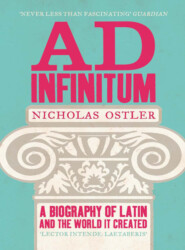По всем вопросам обращайтесь на: info@litportal.ru
(©) 2003-2024.
✖
Empires of the Word: A Language History of the World
Автор
Год написания книги
2019
Настройки чтения
Размер шрифта
Высота строк
Поля
HANNO: mechar bocca MILPHIO: Istuc tibi sit potius quam mihi.
AGORASTOCLES: quid ait? MILPHIO : miseram esse praedicat buccam sibi. fortasse medicos nos esse arbitrarier.
AGORASTOCLES : si ita est nega esse; nolo ego errare hospitem.
MILPHIO: audin tu? HANNO: rufe ynny cho is sam
AGORASTOCLES: sic volo profecto vera cuncta huic expedirier.roga numquid opu’ sit. MILPHIO: tu qui sonam non habes, quid in hanc venistis urbem aut quid quaeritis?
HANNO: muphursa AGORASTOCLES: quid ait?
HANNO: mi uulech ianna
AGORASTOCLES: quid venit?
MILPHIO: non audis? mures Africanos praedicat in pompam ludis dare se velle aedilibus.
HANNO: Good morning to you. MILPHIO: Better you than me.
AGORASTOCLES: What is he saying? MILPHIO: He says his jaw hurts.
Perhaps he thinks we are doctors.
AGORASTOCLES: Then say we’re not; as a stranger, I don’t want him misled.
MILPHIO: Are you listening? HANNO: Doctor, no one is perfect.
AGORASTOCLES : Yes, I certainly want all this explained to me.
Ask him if he needs anything. MILPHIO: You without a belt, why have you people come to this city, or what are you after?
HANNO: What do you mean? AGORASTOCLES: What is he saying?
HANNO: What is he on about to a stranger?
AGORASTOCLES: Why has he come?
MILPHIO: Don’t you hear? African mice [a joke for ‘elephants’?] he says he wants to present to the city wardens for the circus parade.
(#litres_trial_promo)
Still, the fact that the Punic dialogue is in there at all suggests that a smattering of Punic was not strange to Romans at the time, and good for a laugh.
The Carthaginian army (largely made up of mercenaries from all over the western Mediterranean) is said to have been commanded in Greek; certainly the coins struck by the soldiers during the great mutiny in 241–238 BC, the so-called ‘Truceless War’, were inscribed in Greek. And it is known that the annalists who accompanied Hannibal on campaign in Italy, Silenos and Sosylos, wrote in Greek. When Hannibal put up a plaque recording his exploits in a temple of Hera in Sicily, it was in Greek as well as Punic.
(#litres_trial_promo)
The Phoenicians and Carthaginians, notorious as shrewd businessmen, must have been pragmatists; like their modern analogues, they would have focused on the practical utility of a means of communication, and chosen a language accordingly. In the last couple of centuries BC, it was clear that the most generally useful international language in the Mediterranean was Greek.
In Carthage itself, and the North African provinces of Libya (to the east) and Numidia (to the west), Punic did continue to be used. But there is no evidence of Punic literary activity after the Roman conquest (146 BC). Literacy seems to have become restricted to the use of Latin and Greek. The Punic cultural traditions ceased to be fostered, and the physical record of this once highly literate society did not last much longer.
The universal medium for administrative and literary records had been papyrus, a material that survives long-term only in extremely dry conditions (such as those of the Egyptian desert). Texts that were not inscribed on a durable medium such as stone, ivory or clay would not survive unless they were repeatedly copied—a service that was maintained for seminal texts in Greek and Latin, and indeed Hebrew, throughout late antiquity and the Middle Ages, until the printing press made them safe. There was no tradition to preserve Phoenician or Punic texts, and so they perished with the papyrus on which they had been written.
As for the spoken dialects, they will most likely have survived until succeeded by larger-scale neighbouring languages. Interestingly, in both cases, these new languages were Semitic, closely related to Canaanite dialects and in fact rather similar to them. Phoenician in the Lebanon will have yielded to Aramaic in the first century BC; and the last remnants of Punic in North Africa probably succumbed to Arabic in the seventh or even eighth century AD.* (#litres_trial_promo)
Aramaic—the desert song: Interlingua of western Asia
In the fourteenth year of King Hezekiah’s reign, Sennacherib king of Assyria attacked all the fortified cities of Judah and captured them. Then he sent his field commander with a large army from Lachish to King Hezekiah at Jerusalem... The field commander said to [Eliakim, Shebna and Joah, Hezekiah’s emissaries]:
This is what the great king, the king of Assyria says: on what are you basing this confidence of yours?... Yahweh himself told me to march against this country and destroy it.
Then Eliakim, Shebna and Joah said to the field commander, Please speak to us in Aramaic [‘arāmīth], sir, since we understand it. Don’t speak to us in Hebrew [y∂hūdīth] in the hearing of the people on the wall.
But the commander replied:
Was it only to your master and you that my master sent me to say these things, and not to the men sitting on the wall—who like you will have to eat their own shit and drink their own piss?
Then the commander stood and called out in Hebrew:
Hear the words of the great king, the king of Assyria! This is what the king says: do not let Hezekiah deceive you. He cannot deliver you!...
Isaiah xxxvi.1–14 (= 2 Kings xviii.17–29)
These events, which took place in 701 BC, show that at this stage Aramaic, although the lingua franca of senior officers in the Assyrian empire and the kingdom of Judah, was not the language of Judah’s common soldier.
This was to change. The policy of internal deportation so thoroughly applied by the Assyrians was continued by their successors, and this time a notable victim was the Hebrew language, along with many of its speakers in the land of Judah.
When in 609 BC Assyria was at last subjugated by an alliance of Medes from the east and Babylonians from the south, there were no direct linguistic effects, except that Akkadian ceased to be written in Assyria. Aramaic continued as the standard spoken language of Mesopotamia, which was henceforth governed (if at all) from Babylon. But others had noticed the momentous political change. Egypt, in particular, saw an opportunity and invaded Palestine and Syria.
Babylon’s crown prince Nebuchadrezzar (Nabū-kudurri-uur, ‘Nabû, protect my offspring’) responded effectively. Twenty years later, by the time this and perhaps two more Egyptian invasions had been repulsed, Jerusalem, which had twice sided with the Egyptians, was definitively in Babylonian hands. Most of its population went either as refugees to Egypt or as deportees to Babylon.
This is precisely the sort of treatment that kills off a language, as can be attested by the experience of so many indigenous people in the nineteenth and twentieth centuries, moved off their lands by colonists or social engineers, in regions as varied as North Carolina, Queensland, Ethiopia, Siberia and Tibet. There are Hebrew songs of lamentation, all too conscious of the danger:
By the rivers of Babylon we sat and wept when we remembered Zion.
There on the poplars we hung our harps for there our captors asked us for songs, our tormentors asked for songs of joy;
They said, ‘Sing us one of the songs of Zion!’
How can we sing the songs of Yahweh while in a foreign land?
If I forget you, O Jerusalem, may my right hand forget its skill.
May my tongue cleave to the roof of my mouth if I do not remember you...
Psalm cxxxvii.1–6
Yet they did forget, at least the speech of Jerusalem. Amid the crowds of Babylon, Aramaic, which had been the cosmopolitan language for the Jewish elite, became their vernacular, and Hebrew, the language of the people, became a tongue known only to the learned. It had already vanished from speech two generations later, when in 538 the Persian king Cyrus, in one of his first reforms after conquering Babylon, allowed the Jews to return.* (#litres_trial_promo)






